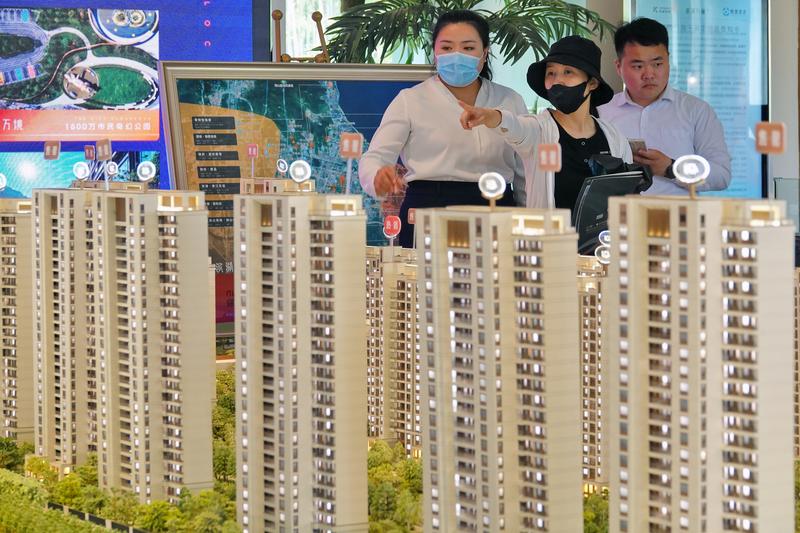 Potential homebuyers look at a property model in Yantai, Shandong province. (TANG KE / FOR CHINA DAILY)
Potential homebuyers look at a property model in Yantai, Shandong province. (TANG KE / FOR CHINA DAILY)
Positive changes have taken place in the property sector thanks to a series of supportive measures to stabilize the market, and real estate's gradual stabilization will also promote overall economic stability in the second half, said the National Bureau of Statistics.
Recent surveys show the real estate market evincing some positive changes, said Fu Linghui, spokesperson of the National Bureau of Statistics and director-general of the Department of Comprehensive Statistics at the National Bureau of Statistics, during a State Council Information Office news conference on Wednesday.
The industrial chain for the property sector is comparatively long, and it can drive related sector development. As the real estate market is stabilizing, its role in supporting the broader economy will become more evident, Fu said, adding that in the process of promoting the healthy development of property, the principle of "housing is for living in, not for speculation" should be firmly upheld so as to satisfy the reasonable housing needs of people.
Shares of property developers staged a broad rally on Wednesday, with the sector rising 1.28 percent on average. Up to 85 stocks rose, four were unchanged and 15 fell, according to China Economic Network's calculations.
China's investment in property development fell 4 percent year-on-year to 5.21 trillion yuan ($776 billion) in the first five months, with 3.95 trillion yuan invested in residential assets, down 3 percent year-on-year, said the National Bureau of Statistics on Wednesday.
Current statistics show the real estate market has been generally in a downward trend so far this year, Fu said.
However, quite a few achievements have been seen in the sector, such as the consistent improvement of the long-term mechanism of the real estate market, the adherence to "housing is for living in, not for speculation", continued efforts taken to stabilize home prices, land prices and market expectations, local property measures to promote stable development of property markets, and progress in government-subsidized property and long-term rental housing.
"All these have contributed to the healthy development of the property market," Fu said.
Local governments lately have taken more resolved measures to stabilize their property markets, and more favorable policies were introduced to effectively meet peoples' rational housing demand. In addition, the cut in personal housing loan interest rates can lower costs of home purchases. And these moves are contributing to property market stability, Fu added.
Residential property sales in terms of floor area totaled 507.38 million square meters in the January-May period, down 23.6 percent year-on-year. In terms of value, sales dropped 31.5 percent year-on-year to 4.83 trillion yuan during the five-month period, according to the NBS.
The property development climate index compiled by the NBS came in at 95.6 points in May.
Against the backdrop of COVID-19 and the high base last year, property data are comparatively weak in year-on-year terms, but the month-on-month figures show the sector's recovery.
In the 17 major Chinese cities that the China Index Academy monitors, new home transaction space grew 8.8 percent in May from the previous month. And the 50 key cities Beike Research Institute surveyed reported pre-owned home transaction volume rose about 14 percent month-on-month in May.
"Home transactions for last year's first five months stood at high levels, leading to the negative percentages for year-on-year data this year," said Yan Yuejin, director of Shanghai-based E-house China Research and Development Institution.
As recent measures are taking effect in the home market, Yan said the home demand is expected to get further boosted and home trading activities will warm up as well.


